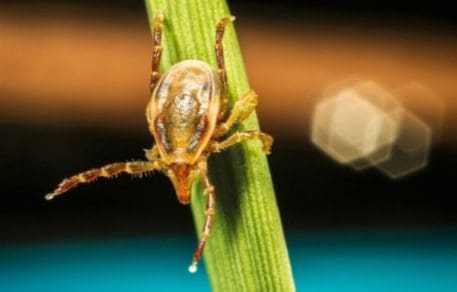
A female Ixodes holocyclus tick. Image – S.L. Doggett, Department of Medical Entomology, Westmead Hospital.
NEW South Wales dog owners are being advised to be alert, but not alarmed, after a deadly tick disease was reported in dogs brought into the state from the Northern Territory.
Ehrlichiosis is a disease spread by the brown dog tick that primarily affects dogs and can be fatal if not properly treated.
NSW Department of Primary Industries issued the advice last week after the disease Ehrlichia canis was detected in several dogs brought into NSW from the territory and ticks carrying the disease were found on dogs in northern South Australia.
Acting NSW chief veterinary officer, Paul Freeman, said Ehrlichia canis (E. canis) is spread by the brown dog tick and it cannot be passed directly from dog to dog.
“If dogs are being treated and/or have tick prevention then the risk of spread is very low.
“E. Canis has not been detected in any NSW origin dogs but several dogs which were brought into NSW from the Northern Territory were diagnosed as positive to E. canis and are undergoing veterinary treatment,” he said.
NSW DPI is focusing on raising awareness and the education of pet owners, vets and shelters to ensure they are aware of the clinical signs and actions required. The department supports the testing of dogs and provides technical advice.
Mr Freeman said NSW has a surveillance plan which includes testing dogs with clinical signs consistent with E. Canis and targeted surveillance, including retrospectively testing historical samples.
“To date, results from all these tests have been negative,” he said.
“People moving or bringing dogs from interstate or adopting rescue dogs should ask questions about where the animals came from and what tick prevention they have.
“Every person bringing dogs into NSW has a general biosecurity duty to ensure as far as is reasonably practicable the biosecurity risk of bringing E. canis into NSW is prevented, eliminated or minimised.”
Dogs which have been diagnosed and are undergoing veterinary treatment for ehrlichiosis do not pose a health risk in transferring the disease to other dogs.
Infection with E. canis is a notifiable disease in Australia. If you suspect ehrlichiosis in any dog in NSW, call the Emergency Animal Disease hotline on 1800 675 888.
Source – NSW DPI.



HAVE YOUR SAY